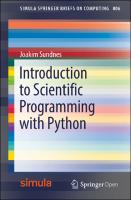Introduction to Scientific Programming with Python
Abstract
This open access book offers an initial introduction to programming for scientific and computational applications using the Python programming language. The presentation style is compact and example-based, making it suitable for students and researchers with little or no prior experience in programming. The book uses relevant examples from mathematics and the natural sciences to present programming as a practical toolbox that can quickly enable readers to write their own programs for data processing and mathematical modeling. These tools include file reading, plotting, simple text analysis, and using NumPy for numerical computations, which are fundamental building blocks of all programs in data science and computational science. At the same time, readers are introduced to the fundamental concepts of programming, including variables, functions, loops, classes, and object-oriented programming. Accordingly, the book provides a sound basis for further computer science and programming studies.
Keywords
Computational Science and Engineering; Professional Computing; Programming Techniques; Software Engineering/Programming and Operating Systems; Mathematics of Computing; Programming Language; Software Engineering; programming; Python; computational science; data science; object oriented programming; open access; Maths for scientists; Applied computing; Computer programming / software engineering; Operating systems; Mathematical theory of computation; Maths for computer scientists; TextbookDOI
10.1007/978-3-030-50356-7Publisher
Springer NaturePublisher website
https://www.springernature.com/gp/products/booksPublication date and place
2020Imprint
SpringerSeries
Simula SpringerBriefs on Computing, 6Classification
Maths for scientists
Computing and Information Technology
Computer programming / software engineering
Software Engineering
Mathematical theory of computation


 Download
Download Web Shop
Web Shop